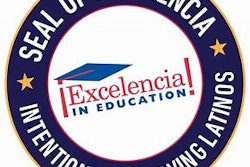The long-awaited report by the President’s Commission on Educational Excellence for Hispanic Americans was finally released last month with few surprises and a grim picture for both Latinos and the nation.
In assessing the status of Latinos in education, Alfred Ramirez, executive director of the commission, states: “We have a crisis on our hands.”
In a letter to President Clinton, Dr. Ana Margarita Guzman, chair of the commission, which was founded in 1994 and was twice hampered by efforts to eliminate it by Congress, wrote: “The bridge to the 21st century for this country will not be built without equity in education for Hispanic Americans — that is, without `leveling the playing field’ for all who are a part of the educational system.”
The commission worries that, with block grant funding to states, the shift away from federal mandates will mean that Latino issues will continue to be ignored and enforcement of federal laws and initiatives will “be specious at best.” There is the fear that Latino students will suffer as a result of locally hostile judicial and legislative climates against people of color — particularly on issues such as immigration, language and affirmative action, “With block grant funding and local decision-making, there could be more inequities,” says Ramirez. “The whole purpose of establishing federal civil rights laws and Supreme Court decisions was because the states and local districts were ignoring the law and not treating people of color in an equal manner.”
Some states, such as California, have already targeted immigrants legal and illegal. In an era of shrinking budgets and smaller government, other states may follow suit. Chances are also likely that some states and local districts will attempt to do away with bilingual education. Ramirez said that while the commission found many things that people already know, they have essentially “put it all under one roof.” Additionally, he said, in meeting the objectives of the executive order that created the commission, “this isn’t even the first step. It’s an entry point.”
The purpose of the commission is “to remove the barriers and inequalities to education for Latinos and to increase federal participation and outreach to Latinos,” according to Ramirez. “The importance of the commission is that it’s the only [federal] initiative dedicated completely to Hispanics in this administration.
One of the things we found out is that if you’re not at the door, you’re an afterthought or listened to less often.” As to the distribution of federal dollars intended for Latinos: “We’re sorely behind,” says Ramirez. “We’re not talking about new dollars. We’re talking about the equitable distribution of existing dollars.”
In general, the commission found that: Latinos attend segregated schools with “an intolerable amount” enrolled below grade level; they have the highest dropout rate in the country; few go to college and fewer graduate. While the college population of Latinos increased from 5.3 percent in 1985 to 8.5 percent in 1993, the total proportion of bachelor’s degrees for Latinos has risen at a slower pace — from 3.5 percent in 1985 to 4.9 percent 1993. Latinos currently comprise more than 10 percent of the U.S. population. Additionally, literacy levels for adults remain low and less than 15 percent of Latinos enroll their children in preschool programs.
The Findings
The commission found that the following factors contribute to educational disparity for Latino students;
Inadequate school funding persists at all levels;
Bilingualism is treated as a liability, rather than as a rich cultural and economic resource;
Critical masses of Latino students are segregated into inadequate schools; and
Lack of political representation makes it difficult for Hispanics to address such disparities.
In its survey of federal agencies, the commission also found that most agencies lack adequate planning or accountability procedures to gauge the participation of Latinos in their programs. It asked thirty-two agencies for data on race and ethnicity specifically on data related to Latinos and Hispanic-serving institutions. While they encountered no hostility, Ramirez says that some agencies either did not have the data requested or exhibited “benign neglect.” For some agencies, it’s obvious why they don’t want people to see the numbers,” says Ramirez.
The data gathered from the agencies will be available to the public and each year will be updated. “People will be able to plug into the information,” says Ramirez. “In the future, the more integrated we are within the departments, the more details … we will get.”
As for federal legislators: “We do not hold Congress as blameless. They decide the budget and they drive the agencies to make decisions,” says Ramirez, noting that Congress twice attempted to both take away the commission’s budget and its ability to work with the federal agencies.
The Recommendations
To improve the status of Latinos in education, the commission recommends:
Ensuring equitable public school funding, ending the segregation of Latinos in public schools, and preventing the termination of educational and related opportunities for immigrant children;
Focusing on substantially decreasing the high rate of dropouts and post secondary attrition;
Establishing partnerships between teachers, schools, community organizations and business community and local and federal government agencies;
Providing preschool education for all eligible Latino children;
Training teachers to deal effectively with multicultural populations and non-English-speaking students;
Ensuring adequate funding and proper implementation of bilingual education programs and advocating a national goal of multilingualism for all citizens.
Increasing the pool of Latino students eligible for higher education opportunities and increasing four-year college access initiatives for Hispanic high school graduates and community college transfer students — especially financial support initiatives.
Ensuring federal interagency coordination to increase the flow of services and the pooling of resources in support of Hispanic initiatives.
Regardless of who is elected in the next presidential election, Ramirez expects the commission to carry on its work. The bipartisan commission of educators, civil rights advocates and the business community was actually first founded by the Bush administration, he notes.
Ramirez’s advice for the person who occupies the White House for the next four years: “We need a firm commitment from the President and the cabinet. This was just the first round. The next step is accountability.”
COPYRIGHT 1996 Cox, Matthews & Associates
© Copyright 2005 by DiverseEducation.com















